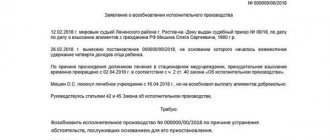Home » Alimony » Enforcement proceedings on alimony
1
Issues related to the conduct of enforcement proceedings are regulated by the Federal Law “On Enforcement Proceedings” and the Methodological Recommendations on the procedure for fulfilling the requirements of enforcement documents for the collection of alimony (No. 01-16 of June 19, 2012). And being aware of the key points of the procedure for withholding funds is important not only for officials competent in this area, but also for the parties to the process - the collector and the debtor.
When necessary
The need to initiate enforcement proceedings arises if there is no agreement between the recipient and the payer on the procedure and amount of monthly transfers.
Most often, this happens when the alimony holder refuses to voluntarily pay part of his income for the maintenance of a relative or family member who, by law, needs to receive financial assistance from him.
In accordance with the Family Code of the Russian Federation, the category of alimony recipients includes:
- Minor children.
- Adult disabled children.
- Disabled needy parent.
- Spouse (including ex-wife) during pregnancy and during the first three years of the child’s life.
- A spouse caring for a common disabled child (until he reaches 18 years of age) or a disabled child from childhood of group I.
- The husband/wife or former spouses, if they lost their ability to work during marriage or within a year after the divorce, or retired no later than five years after the divorce.
- Minor brothers, sisters and grandchildren, if they cannot get the necessary help from their parents.
- Adult disabled brothers, sisters, grandchildren in case of need and lack of material support from parents, children, spouse.
A person in need of assistance or his legal representative (one of the parents, guardian, trustee) for the forced collection of alimony first applies to the court, and then to the bailiff, who, by virtue of the powers vested in him, organizes the withholding of funds from the debtor’s income in during enforcement proceedings.
Is it possible to suspend alimony payments?
If the payment of alimony is made by voluntary agreement of the parties, then in the absence of deductions the alimony payer can turn to the bailiffs. It is best to do this in advance, because if the claimant contacts a notary and puts a mark on the document indicating a violation of obligations, the case may be taken to court.
If the payer, for any reason, stops paying the funds assigned by the court, the claimant may file a claim to begin enforcement proceedings. This statement must also be recorded by the bailiffs.
Reasons for establishment
According to Art. 30 of the Federal Law “On Enforcement Proceedings” (No. 229-FZ), a case for the collection of alimony is initiated on the basis of a writ of execution and a written statement from the interested person.
The following may be accepted as an executive document:
- Agreement on payment of alimony with a certifying signature and stamp of a notary.
- Court order.
- A court decision to collect alimony in a fixed amount.
An application for opening enforcement proceedings is drawn up by the claimant or on his behalf (only a parent, guardian, trustee or proxy acting on the basis of a notarized written authority can become a representative).
Is it possible to automatically suspend alimony payments?
The reasons why bailiffs can suspend the forced withholding of alimony payments are determined by Art. 40 Federal Law of the Russian Federation “On Enforcement Proceedings”. The article contains data on alimony maintenance for various categories of payment recipients. Alimony maintenance is suspended when the following circumstances occur:
- Death of a person obligated for alimony, recognition of him as dead. For other obligations, the heirs of the deceased become legal successors. But this rule does not apply to alimony obligations. Enforcement proceedings are terminated.
- If, by a court decision, the alimony provider is declared incompetent. In this case, alimony maintenance is suspended for an unspecified period.
- Service in the ranks of the Russian Armed Forces during a period of emergency, martial law, participation in a military conflict. These circumstances allow the payer to independently apply to the FSSP to suspend alimony payments.
The legislation also defines a number of cases when a bailiff can suspend (but is not obligated to) the collection of alimony from the payer’s earnings:
- the alimony is undergoing inpatient treatment in a medical institution;
- the person obligated for maintenance is undergoing military service upon conscription;
- the debtor or offspring (recipient of alimony payments) is wanted;
- The court document establishing child support for minors is disputed.
What does the claimant have the right to expect?
The standard amount of alimony maintenance is not established by law. It is determined individually, based on the level of income of the payer and recipient, the existence of other material obligations of the alimony provider, the need to pay off additional sources of expenses, etc.
There are certain instructions regarding the amount of alimony in favor of a minor - according to Art. 81 of the RF IC, by default, a percentage of the parent’s total income is allocated for the maintenance of children: 25% for one child, 33% for two and 50% for three or more.
The following are taken into account:
- Wage.
- Prizes, allowances.
- Job salary.
- Pensions, benefits (including unemployment).
- Scholarships
- Income from business activities, rental and sale of personal property, etc.
If the reliable amount of the payer’s income cannot be established or it is unstable, the child’s representative has the right to file a claim for the recovery of alimony in a fixed amount.
Monthly maintenance for other family members is determined exclusively in the form of a fixed payment (not in a shared ratio).
Termination of proceedings due to adoption of a child
A parent deprived of rights to a child is not exempt from his financial support - payment of alimony. This rule is directly provided for by the RF IC. Despite the loss of all parental rights, including the right to receive maintenance from his child in old age, a citizen is obliged to pay alimony until the child reaches the age of majority, or gains full legal capacity before that moment.
However, if the child is adopted by other citizens, then the parent who has lost his rights to the child is exempt from paying child support.
Debtor's liability
For violation of the requirements set out in the executive document, the alimony provider faces administrative and criminal liability.
Preventive measures in accordance with the Code of the Russian Federation on Administrative Offenses are applied at the first sign of evasion. It can be:
- 150 hours of compulsory work.
- 10–15 days of administrative arrest.
- 20,000 rubles as a fine.
In cases where the violator was brought to administrative responsibility, and this did not have a positive impact on his behavior, the punishment is assigned to him, already based on the provisions of the Criminal Code of the Russian Federation.
Malicious evasion of alimony obligations is punishable by:
- 1 year of correctional labor.
- 1 year of forced labor in specialized centers.
- 3 months of arrest in complete isolation from society.
- Up to 12 months of imprisonment in correctional institutions.
You can achieve the appointment of preventive measures for an unscrupulous alimony provider through the court or the bailiff service
How to write an application to revoke a writ of execution for alimony?
1 answer. Srednekolymsk Viewed 21 times. Asked 2013-03-26 03:34:22 +0400 in the topic “Family Law” I was fired at my own request (I was forced to write a statement), but after 2 days I wrote a second one about the recall. — I was fired of my own free will (they were forced to write a statement), but 2 days later I wrote a second one regarding the recall. Further
1 answer. Moscow Viewed 137 times. Asked 2012-07-30 12:17:49 +0400 in the topic “Labor Law” How to draw up a statement of claim for the revocation of divorce documents? — How to draw up a statement of claim for the revocation of divorce documents.
Deadlines
In accordance with Art. 211 of the Civil Procedure Code of the Russian Federation, an order or court decision to collect alimony is subject to immediate execution. Therefore, if voluntary repayment of obligations cannot be expected from the payer and a debt has already arisen on them, the interested person has the right to turn to the bailiffs.
The period of application is limited to the period of validity of the obligations to support the relative plus three years after. For example, apply for collection of arrears of alimony for:
- a minor until he reaches 21 years of age (18 years + 3 additional years);
- for a pregnant woman or mother of a common child - until the child reaches 6 years of age.
Demands to establish maintenance for a pensioner or disabled person can be presented at any time, since the basis for receipt can disappear only in the event of a significant improvement in the financial situation of the recipient, since working capacity will no longer be restored (except for cases of recovery of a person who has not reached retirement age).
Enforcement proceedings for the collection of alimony should last no more than two months. During this time, the bailiffs are obliged to achieve repayment of obligations by the debtor or ensure the receipt of the necessary amounts from the funds belonging to him.
Consideration of the application by the court
The case must be heard by the court of the district in which the enforcement proceedings were initiated. A ruling on the case must be made no later than 10 days from the date the application is received by the court.
Documents can be transferred directly to the court office by the applicant or another person by proxy, or sent by mail.
To resolve the issue, the court invites the applicant, the debtor, as well as the bailiff conducting the proceedings. If any of the parties fails to appear, the court will resolve the issue without his participation. The ruling made in the case is sent by the court to all participants in the process. If either party does not agree with it, he can file a private complaint.
Procedure for initiating enforcement proceedings
The opening of a case on forced collection of alimony is carried out by a bailiff after receipt of a corresponding application on behalf of the recipient (or his legal representative) and a writ of execution.
An authorized official will issue a resolution on this matter within 24 hours. The bailiff sends a copy of it to the debtor, and if he does not reconsider his position within 24 hours after receiving it, enforcement measures will be taken. They are preceded by:
- Search for the debtor, his place of work, collection of information about the sources and amount of his income.
- Sending a notice of opening a case.
If, within 24 hours after delivery of the summons, the alimony provider does not send his official consent to the presented demands and does not begin to transfer money to the recipient, legal proceedings will be initiated.
Statement
An appeal to the bailiffs must be in writing and display the following information:
- Full name and passport details of the claimant, his telephone number or other contact information.
- Details of the executive document.
- Calculation of the amount of alimony obligations, amount of debt.
- Full name, place of residence, work, location of personal property, sources of income of the alimony provider.
- Bank account number of the creditor (for transferring funds).
- Other information that may affect the course and results of enforcement proceedings.
Documentation
The following documents are attached to the application:
- Executive document.
- Certificate of income of the debtor.
- Birth or marriage certificate of the claimant, a certificate from the ITU (to confirm the basis for receiving alimony).
- Other documents allowing you to establish the amount of salary.
The minimum required when contacting a bailiff is an application and a writ of execution. The remaining papers can be requested by the official independently during the search for the debtor.
Is a counter-suspension possible?
In some cases, the collector of such payments may also apply for suspension of the payment of alimony for the maintenance of a minor child. Reasons for such a decision may be:
- Second marriage.
- The mother is able to independently provide for her child.
In this case, the judicial authority will also consider all the circumstances of the case. The financial situation of both sides of production, their social status, as well as the mutual desire to come to a solution that will suit all members of this family.
As a rule, such petitions are rejected by the court, since the funds are transferred by the alimony payer for the maintenance of a minor child. And if the mother does not want to receive them, she can open a special account in which the money will be accumulated until the child reaches the age of 18, after which he will have the right to independently manage the accumulated amount.
Most often, such requests are granted only in cases where payments are made for the maintenance of other relatives, for example, when a husband supports his disabled wife. In such a situation, after being admitted to a hospital, the spouse may apply for a suspension of payments, since her maintenance in this medical institution is fully paid for and she does not need additional funds.
Complete termination of alimony payments is permitted only in the following cases:
- If one of the parties' financial situation changes.
- If one of the parties' marital status changes.
- Other situations in which it becomes necessary to cancel obligations or suspend their execution for a time.
When will the application be denied?
The legislation provides for cases when, instead of a decision to initiate proceedings, the bailiff issues a refusal. This happens in the following cases:
- The application is missing or not signed by the recipient (except in cases where a personal signature is not required, for example, due to the incapacity of the claimant or in the case when representatives act on his behalf by power of attorney).
- The territorial jurisdiction of the consideration of cases has been violated.
- The deadline for filing claims for alimony has passed.
- The writ of execution is missing, it was drawn up with violations, or a case has already been initiated based on it.
The bailiff's refusal can be appealed to a higher official or in court within 10 days.
Actions of the bailiffs
The further process depends on the presence and size of alimony debt. If the payer has no accumulated outstanding obligations or they do not exceed 10,000 rubles, the bailiff issues a decree to withhold the established amount from his income and a decree to terminate enforcement proceedings.
If the alimony provider has a debt in the amount of more than 10,000 rubles. , the case does not stop, and the authorized official, as part of debt collection, carries out the following actions:
- Sends to the place where the debtor receives income a package of documents necessary to withhold alimony.
- If the income is insufficient, it forecloses on the bank accounts and other property of the alimony provider.
- Sells the payer's material assets at auction.
The bailiff periodically carries out measures to search and identify new (or previously undetected sources of income) until the debt is repaid.
Procedure for suspending alimony
As a rule, the initiator of the suspension of child support payments is the payer who, for some reason, is unable to make such payments. In order for this entire procedure to take place in a legal manner and not become the basis for bringing the defaulter to justice, the person must notify certain authorities about the reasons.
First of all, the citizen concerned must file a petition containing all the evidence in his possession. It is necessary to take into account the fact that after the relevant court decision is made, all alimony payments must be made according to the established schedule. Accordingly, all debts incurred without proper notification must be paid in full, taking into account penalties and fines.
One of the reasons for suspending alimony payments is the loss of a permanent job by the alimony payer. To do this, a person must first contact the Employment Center to apply for unemployment benefits for the period of employment. Of course, the amount of such a payment is several times less than the usual monthly earnings, so a person has the right to go to court to suspend the deductions until he finds a new job.
If, during the analysis of the submitted documents, the judge considers the reasons for the suspension to be valid, the payer will be assigned such temporary relief. In this case, payment of funds for the maintenance of a young child will be the responsibility of the social insurance fund, and the money will be transferred from public funds. However, the amount of such payments may be several times less than the previous ones, since the calculation of alimony will be made based on the average wage in this region of the country.
This is important to know: Disciplinary sanctions applied to a municipal employee
Suspension of alimony payments is possible only in cases where the funds are intended to support a minor child. In all other cases, suspension of obligations is not allowed, and the executive document is canceled.
How to suspend enforcement proceedings for alimony
The suspension of the case for the collection of alimony is carried out by the court or the bailiff.
The court suspends proceedings in the following cases:
- The owner of the property filed a claim in court to lift the arrest or challenge the results of its assessment.
- At the request of the interested party, an appeal of the executive document is carried out.
- The debtor is on a long business trip.
- An appeal by the claimant, debtor or bailiff for clarification of the provisions of the writ of execution.
- Initiation of a case to appeal the actions/inactions of the bailiff.
These powers are transferred to the bailiff if the debtor:
- Loses capacity.
- Participates in hostilities.
- Files a claim regarding the procedure for paying the enforcement fee.
- He is being treated in an inpatient facility.
Proceedings are suspended until the circumstances that led to this cease.
Is it possible to suspend alimony by revoking the writ of execution?
In life, sometimes situations arise when it is literally vital for the alimony payer to suspend the payment of alimony. This can be done only in agreement with the claimant, asking him to withdraw the writ of execution.
Such reasons may include the following circumstances:
- Serious illness, before determining the disability group and establishing the appropriate pension;
- Natural disasters or socio-political unrest;
- Job loss;
- Difficult life circumstances (serious illness of family members, close relatives).
In any of these cases, the payer cannot fulfill his alimony obligations and all this inevitably entails an increase in maintenance debt and subsequent liability for non-payment of alimony. And after some time, if the debt is not repaid, it will be collected from his property or funds in his accounts.
The most important thing here is that the alimony payer is not given the right to ask for their suspension! This can only be done by the recipient, who will be able to revoke the writ of execution and then submit it again. At the same time, the bailiffs do not care at all why the writ of execution is being revoked - they will return it and that’s it. There is no particular need to motivate the application to revoke the sheet.
The only exception is when the debtor performs military service under emergency conditions, which may be grounds for suspending the collection of alimony.
Termination of enforcement proceedings
The case of forced collection of alimony is closed in the following cases:
- Death of one of the parties to the process (debtor and/or claimant).
- Loss of the opportunity for the debtor to begin to fulfill the demands of the creditor.
- Refusal by the claimant of alimony.
- The parties reach a settlement agreement in court.
- Recognition of the executive document as invalid.
When approving the decision to terminate enforcement proceedings, the bailiff makes a note about the full or partial fulfillment of alimony obligations, and their re-examination becomes impossible.
Legal grounds for termination of the enforcement procedure for alimony
The assignment of alimony payments, as well as the termination of their claim, is of a declarative nature.
Therefore, a citizen who has evidence that there is no further need to transfer funds to his child must file a statement of claim and submit it to the court. Based on the results of the proceedings, the judge will make his decision to terminate the enforcement proceedings or oblige the alimony obligee to pay financial assistance in the future. In accordance with Federal Law No. 229, Article 120 of the RF IC and Resolution of the Plenum of the Supreme Court No. 50, the grounds sufficient to completely stop the enforcement procedure for the forced collection of alimony are:
- the child reaches the age of eighteen;
- marriage or official employment by minors;
- adoption of a child by another citizen;
- challenging the relationship between the payer and the child;
- entry by the former spouse, in whose favor alimony was paid, into a new legal marriage;
- death of the recipient of financial assistance or alimony;
- expiration of the agreement between the baby’s parents, if one has been drawn up.
Suspension of claims for alimony in favor of a minor
In addition to the complete cessation of proceedings, the RF IC allows for the suspension of alimony payments. To initiate such a procedure there must be one of the following grounds:
- death of the payer;
- significant deterioration in the health status of the alimony obligee;
- the payer's stay on a business trip;
- putting the alimony worker on the wanted list for malicious non-payment of obligations.
The suspension of the procedure for collecting obligations is carried out for an unlimited period. If the reason for which the temporary freeze of enforcement proceedings is carried out disappears, then the court has the right to continue collecting funds.
Ending
Proceedings for the collection of alimony are considered completed in the following cases:
- Fulfillment of stated requirements.
- Declaring the debtor bankrupt.
- Transferring a copy of the writ of execution to the debtor’s place of work to collect monthly payments from him in the established amount.
The termination of the case is not an obstacle to carrying out enforcement actions on it in the future - both the claimant himself and the senior bailiff or his deputy have the right to resume the process on their own initiative.
Qualified legal assistance is needed at all stages of the process of collecting alimony, but especially during enforcement proceedings. Without it, the creditor and the debtor risk facing unlawful actions of officials, and each of them risks the dishonest behavior of the opposite party.
To avoid misunderstandings and obvious violations of your legal rights, it is important to contact lawyers in a timely manner, especially since, thanks to the specialists of our website, this is available free of charge and in a format convenient for you - online or by telephone.
FREE CONSULTATIONS are available for you! If you want to solve exactly your problem, then
:
- describe your situation to a lawyer in an online chat;
- write a question in the form below;
- call Moscow and Moscow region
- call St. Petersburg and region
Save or share the link on social networks
- FREE for a lawyer!
Write your question, our lawyer will prepare an answer for FREE and call you back in 5 minutes.
By submitting data you agree to the Consent to PD processing, PD Processing Policy and User Agreement
Useful information on the topic
Application to the prosecutor's office for non-payment of alimony
Alimony payments help a single mother or father stay afloat, support...
Indexation of alimony
Due to the fact that prices are constantly rising, in some...
1
Minimum amount of child support
There is not a single clause, regulation or clarification in the legislation that...
1
Can a father or mother file for child support for their son?
Parents who have cared for their children in their later years have the right...
6
Receipt for receipt and payment of child support
Alimony can be transferred to the recipient in any convenient way, the legislation in this...
1
Court order for the collection of alimony
The rules for collecting alimony have changed somewhat since 2020 and...








